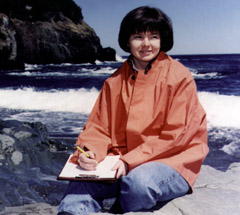 |
Every night,
tiny marine animals called zooplankton migrate up from deep in the
cold ocean to eat tiny marine plants called phytoplankton; and every
morning they sink deep below the surface to hide from predators
that hunt by daylight. On the surface of the ocean, a ship-based
sounder uses sonar to measure the depth of a plankton cloud that
scatters sound waves. Researchers and technologists aboard the ship
take samples from above, within, and below this "scattering layer",
and wherever the temperature and salinity of the water changes.
These samples are preserved for study in laboratories which are
usually based at the ship's home port.
Canadian marine technologists work in our own
territorial waters and in foreign waters around the world. Daphne
has worked for Memorial University of Newfoundland, doing a three-month
work term in the same laboratory where she was trained at the
affiliated Fisheries and Marine Institute. Later, Daphne signed
on to a project that took her all the way to Thailand for six
months of work and study.
Daphne is trained to do the practical work for
and with marine researchers. "We do water sampling and testing,
and work with fisheries or in the oil patch," she says. Depending
on the contract, a marine environmental technologist might be
responsible for collecting water samples, processing them with
the aid of various pieces of lab equipment ranging from microscopes
to chromatographs, and preparing the data for written reports.
|
 |


